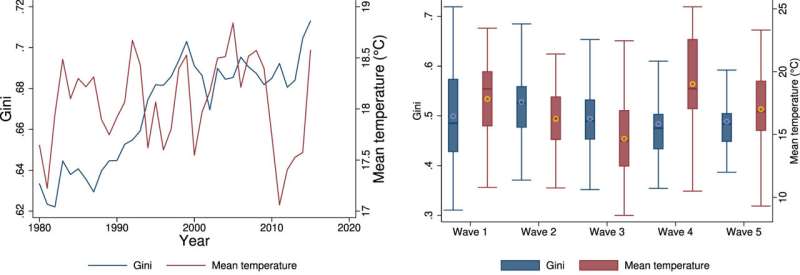This article has been reviewed according to Science X's editorial process and policies. Editors have highlighted the following attributes while ensuring the content's credibility:
fact-checked
peer-reviewed publication
proofread
Warming world, widening gap: Climate change's toll on poverty and inequality in South Africa

Scientific evidence shows that climate change is already negatively affecting inequality and poverty, but the extent to which this happens at the micro-level remains relatively unexplored. Investigating the distributional effects of climate change at the micro-level is particularly relevant in low- or middle-income countries, where vulnerable populations are more susceptible to its impacts.
A new paper published in Environmental Research Letters investigates the relationship between temperature and inequality, poverty and welfare in South Africa at the national and sub-national level and highlights—in addition to the need for climate change adaptation—the co-benefits of decarbonization in reducing socioeconomic disparities among affected communities.
The study was conducted by a team of researchers from CMCC@Ca'Foscari, the strategic partnership between CMCC Foundation and Ca' Foscari University of Venice, RFF-CMCC European Institute on Economics and the Environment (EIEE) and London School of Economics and Political Science (LSE).
Authors find that the relationship between temperature and inequality and poverty is non-linear, with inequality lowest at moderate temperatures. However, once temperatures increase beyond a certain threshold (15-17°C), the inequality gap among different income groups widens, threatening the livelihood of the most vulnerable communities.
This effect is particularly noticeable for the poorer segments of the population, whose productivity and wages decline as temperatures increase, while the impact on the richer segments is less significant due to their greater adaptive capacity. In particular, agricultural households are more likely to experience an increase in inequality due to warming.
Through projections under multiple warming scenarios, authors find that climate change is expected to reduce average growth and exacerbate inequalities in the future.
Comparing the outcomes of the moderate Representative Concentration Pathway scenario (RCP6.0) to a reference scenario without warming they found that, by the end of the century, the Gini coefficient—a statistical measure of economic inequality in a population—in South Africa is expected to increase by 3 to 6 points. This would result in a potential welfare loss of approximately 50% when combined with the impact of warming on GDP (which alone can reach up to 43% by 2100 in South Africa).
Unless climate change policies incorporate inequality in their design, authors conclude, they may have unintended consequences and increase the burden on disadvantaged groups.
"Climate change not only increases inequality, but increased inequality exacerbates many of the climate change-induced impacts on society through increased exposure and vulnerability. Without strong mitigation efforts—welfare and well-being will worsen substantially due to future climate change," says Shouro Dasgupta, a researcher at CMCC, Ca' Foscari University of Venice, and Visiting Senior Fellow at the Grantham Research Institute on Climate Change and the Environment, London School of Economics and Political Science (LSE).
"Well-informed and community-specific adaptation policies can reduce the negative consequences of excess warming while harnessing the potential benefits of keeping temperature increases to moderate levels," says Soheil Shayegh, a scientist at RFF-CMCC European Institute on Economics and the Environment (EIEE).
"That climate change is likely to affect not only biophysical systems, but also the economy is now widely accepted. However, less is known on how this economic impact is distributed across different households. We find here for the case of South Africa that global warming will hit poorer households harder, thus leading to an increase in inequality. Climate mitigation is therefore crucial not only from an ecological, economic, but also inequality perspective," says Johannes Emmerling, senior scientist at RFF-CMCC European Institute on Economics and the Environment (EIEE).
More information: Shouro Dasgupta et al, Inequality and growth impacts of climate change—insights from South Africa *, Environmental Research Letters (2023). DOI: 10.1088/1748-9326/ad0448
Journal information: Environmental Research Letters
Provided by CMCC Foundation - Euro-Mediterranean Center on Climate Change





















